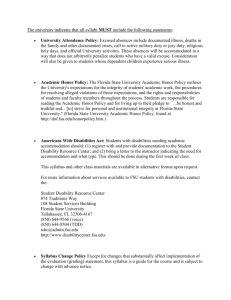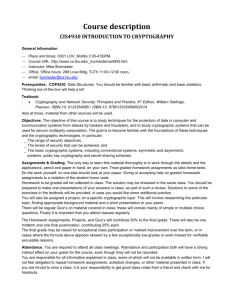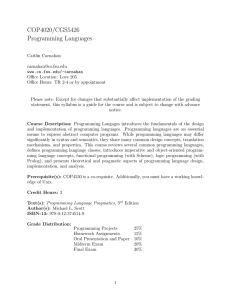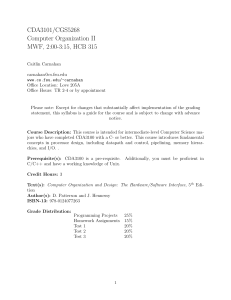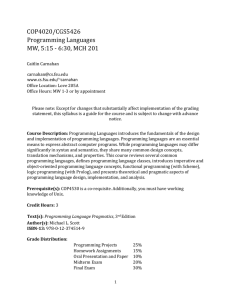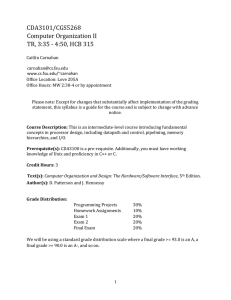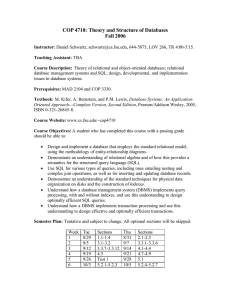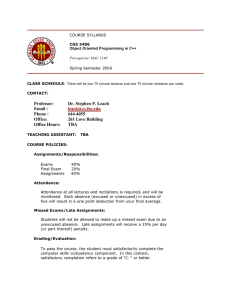COURSE SYLLABUS CEN 4YYY Software Engineering II Design and Development
advertisement
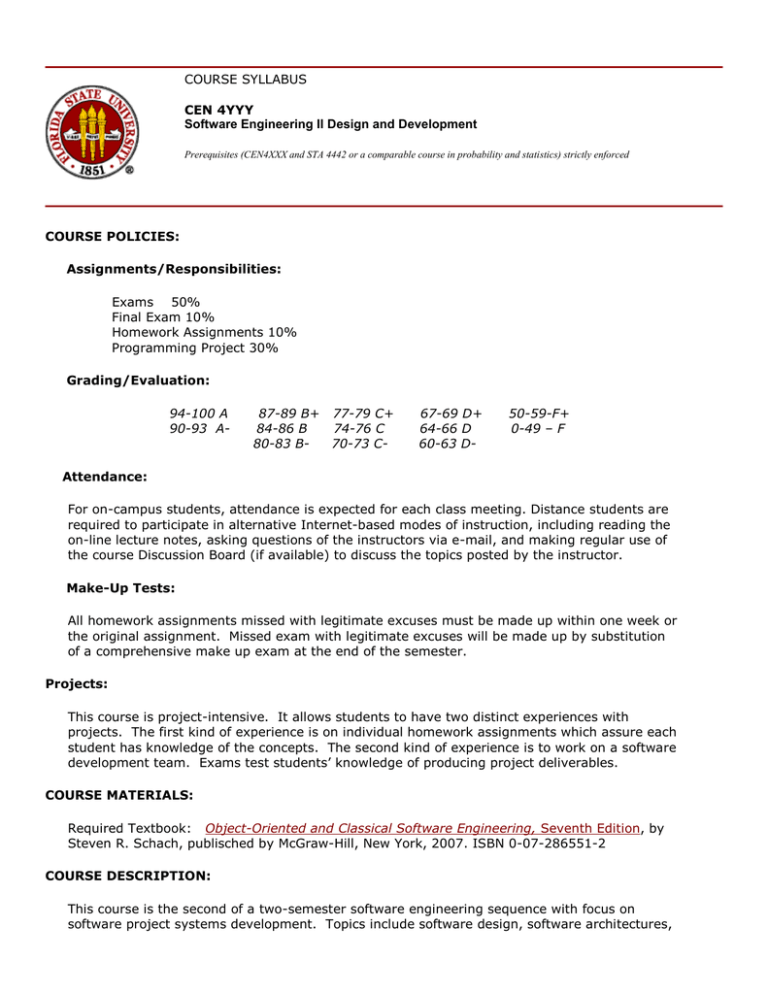
COURSE SYLLABUS CEN 4YYY Software Engineering II Design and Development Prerequisites (CEN4XXX and STA 4442 or a comparable course in probability and statistics) strictly enforced COURSE POLICIES: Assignments/Responsibilities: Exams 50% Final Exam 10% Homework Assignments 10% Programming Project 30% Grading/Evaluation: 94-100 A 90-93 A- 87-89 B+ 77-79 C+ 84-86 B 74-76 C 80-83 B70-73 C- 67-69 D+ 64-66 D 60-63 D- 50-59-F+ 0-49 – F Attendance: For on-campus students, attendance is expected for each class meeting. Distance students are required to participate in alternative Internet-based modes of instruction, including reading the on-line lecture notes, asking questions of the instructors via e-mail, and making regular use of the course Discussion Board (if available) to discuss the topics posted by the instructor. Make-Up Tests: All homework assignments missed with legitimate excuses must be made up within one week or the original assignment. Missed exam with legitimate excuses will be made up by substitution of a comprehensive make up exam at the end of the semester. Projects: This course is project-intensive. It allows students to have two distinct experiences with projects. The first kind of experience is on individual homework assignments which assure each student has knowledge of the concepts. The second kind of experience is to work on a software development team. Exams test students’ knowledge of producing project deliverables. COURSE MATERIALS: Required Textbook: Object-Oriented and Classical Software Engineering, Seventh Edition, by Steven R. Schach, publisched by McGraw-Hill, New York, 2007. ISBN 0-07-286551-2 COURSE DESCRIPTION: This course is the second of a two-semester software engineering sequence with focus on software project systems development. Topics include software design, software architectures, testing, deployment, software metrics, change management, reusability, portability, and interoperability. COURSE OBJECTIVES: A student who has completed this course with a passing grade should be able to: 1. Define design specifications for software development 2. Recognize and use selected design paradigms 3. Compute design metrics 4. Define selected design architectures 5. Define and design human computer interfaces 6. Define and develop software components 7. Use UML as a template for writing software 8. Adhere to software coding Standards 9. Test software for both user and developer 10. Deploy software in selected environments 11. Use configuration management tools. ACADEMIC HONOR POLICY: The Florida State University Academic Honor Policy outlines the University’s expectations for the integrity of students’ academic work, the procedures for resolving alleged violations of those expectations, and the rights and responsibilities of students and faculty members throughout the process. Students are responsible for reading the Academic Honor Policy and for living up to their pledge to “. . . be honest and truthful and . . . [to] strive for personal and institutional integrity at Florida State University.” (Florida State University Academic Honor Policy, found at http://dof.fsu.edu/honorpolicy.htm.) AMERICANS WITH DISABILITIES ACT: Students with disabilities needing academic accommodation should: (1) register with and provide documentation to the Student Disability Resource Center; and (2) bring a letter to the instructor indicating the need for accommodation and what type. This should be done during the first week of class. This syllabus and other class materials are available in alternative format upon request. For more information about services available to FSU students with disabilities, contact the: Student Disability Resource Center 97 Woodward Avenue, South 108 Student Services Building Florida State University Tallahassee, FL 32306-4167 (850) 644-9566 (voice) (850) 644-8504 (TDD) sdrc@admin.fsu.edu http://www.disabilitycenter.fsu.edu/
